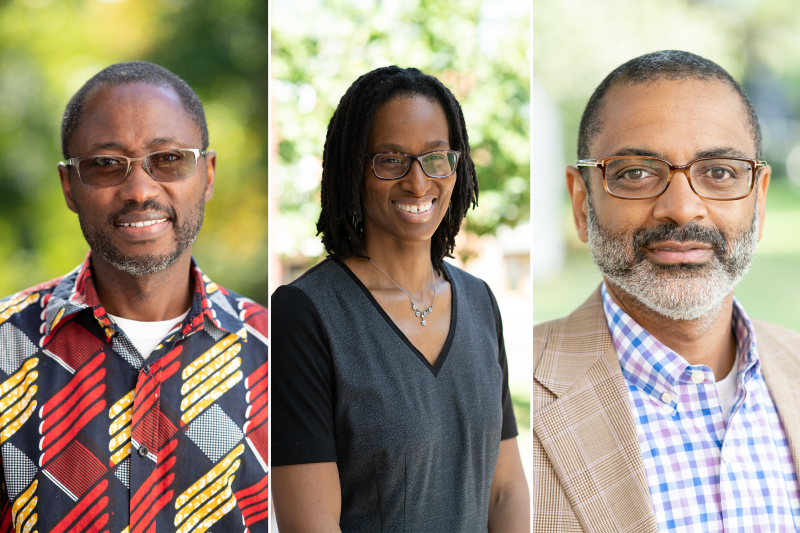Africana Studies Program Launches Yearlong Series The Africana Studies Program at W&L, in partnership with the Rupert H. Johnson Jr. Program in Leadership and Integrity, will host a series of events focused on activism and Black life. It kicks off Aug. 26 with a panel discussion featuring three W&L faculty members.
“This is an opportunity for all of us — not only students, but also faculty, staff and the Lexington community — to have a greater sense of the stakes for all of us, not only for Blacks.”
~ Professor Mohamed Kamara
Activism is a thread that’s been woven through the struggle for equality for generations, but the death of George Floyd at the hands of Minneapolis police in May brought a greater awareness of inequality and a renewed vigor for change in America.
For faculty in the Africana Studies Program at Washington and Lee University, it seemed the perfect time to plan a series of events that demonstrate the purpose of their discipline, shine a light on experts both inside and outside the W&L community, and arm audiences with knowledge to continue the pursuit of equal rights.
That series, “Activism and Black Life,” which is co-sponsored by the Rupert H. Johnson Jr. Program in Leadership and Integrity, will include guest speakers, panel discussions, film screenings, music listening sessions and more. It kicks off at 6 p.m. on Wednesday with a panel discussion, “Activism in the Black Imagination,” featuring Mohamed Kamara, associate professor of Romance Languages and head of the Africana Studies Program; Michael Hill, professor of Africana Studies; and Elicia Cowins, assistant professor of accounting.
“We would like students to come out of this series armed with the knowledge they need to inform their activism,” Kamara said. “The best way to walk the walk is to know fully what we are talking about. This is an opportunity for all of us — not only students, but also faculty, staff and the Lexington community — to have a greater sense of the stakes for all of us, not only for Blacks. Because when any one of us is depleted, we are all depleted, and when one of us is improved, we are all improved.”
The convergence of national events and campus-based issues surrounding racial justice creates an opportune moment to highlight the Africana Studies discipline, which Kamara said is “probably the only academic discipline that came out of grassroots activism.”
“A lot of people associate Africana Studies with Black topics,” Hill said, “but they don’t appreciate our field’s deep investment in troubleshooting democracy.”
The first several events in the series will showcase expertise that already exists at W&L. Panel discussions in September and October will feature Director of Institutional History Lynn Rainville; Nneka Dennie and Henryatta Ballah, who are both new faculty in the History Department; and Brandon Hasbrouck, a member of the W&L School of Law faculty.
Later this year and in early 2021, guest speakers will be incorporated into the series schedule. They will include Rita Davis ’93, legal counsel to Virginia Gov. Ralph Northam; and Fordham University history professor Nana Osei-Opare. The annual DeLaney Lecture, on Feb. 17, will examine the topic of Black entrepreneurs as activists in a discussion co-sponsored by the Connolly Center for Entrepreneurship, Main Street Lexington and the Office of Inclusion and Engagement.
“We really wanted to suture together the different facets of campus by way of illustrating the types of talents that are here,” Hill said, “and we wanted to have an aggregation of voices that present a full picture of black activism.”
Students have not been left out of planning for the series. In fact, Hill said, it was long, intellectual conversations with students in his office about pop culture that inspired a big component of the series, the Looking at Blackness initiative. The LAB events, which will be sprinkled throughout the academic year, will include screenings of films like “Dear White People” and listening sessions for music, including a Nina Simone live concert. The Student Association for Black Unity (SABU) at W&L will provide student facilitators for the discussions.
While they appreciate the value of lectures, Hill and Kamara are looking forward to the wide range of formats for series events, which they hope will spur plenty of interaction and dialog. “It feeds perfectly into the democratic spirit of Black protest, Black struggle and the Black liberation movement writ large,” Kamara said. “There is no one way to get to knowledge; you come at it from very different angles because knowledge itself is a complex phenomenon.”
It is their hope that the series will dovetail nicely with the first-year readings of Ibram X. Kendi and Kendi’s upcoming visit with students. They also hope to see series topics woven into courses or assigned to students as extra credit opportunities. Most of all, they would like for students to gain respect for the work that has already been done in the battle for equality and understand that the work is ongoing.
“The series itself should be understood and appreciated from the context of the global anti-racism and anti-discrimination struggle,” Kamara said. “We may never be able to eliminate racism, but we can at least begin to chip away at, if not eliminate, systemic racism.”
Click here for a full schedule of events for “Activism and Black Life.”
 Africana Studies’ 2020-21 speaker series will kick off Aug. 26 with a panel discussion featuring professors Mohamed Kamara, Elicia Cowins and Michael Hill.
Africana Studies’ 2020-21 speaker series will kick off Aug. 26 with a panel discussion featuring professors Mohamed Kamara, Elicia Cowins and Michael Hill.
You must be logged in to post a comment.